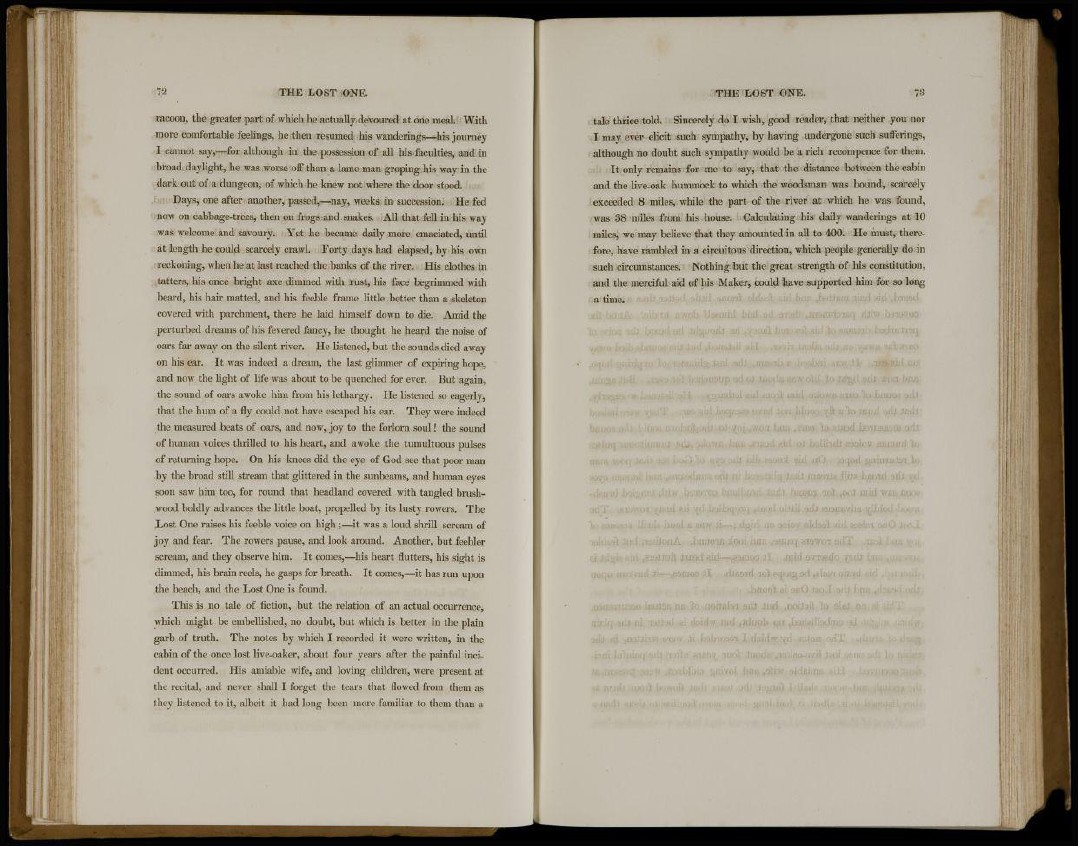
racoon, the greater part of which he actually devoured at one meal. With
more comfortable feelings, he then resumed his wanderings—his journey
I cannot say,—for although in the possession of all his faculties, and in
broad daylight, he was worse off than a lame man groping his way in the
dark out of a dungeon, of which he knew not where the door stood.
Days, one after another, passed,—nay, weeks in succession. He fed
now on cabbage-trees, then on frogs and snakes. All that fell in his way
was welcome and savoury. Yet he became daily more emaciated, until
at length he could scarcely crawl. Forty days had elapsed, by his own
reckoning, when he at last reached the banks of the river. His clothes in
tatters, his once bright axe dimmed with rust, his face begrimmed with
beard, his hair matted, and his feeble frame little better than a skeleton
covered with parchment, there he laid himself down to die. Amid the
perturbed dreams of his fevered fancy, he thought he heard the noise of
oars far away on the silent river. He listened, but the sounds died away
on his ear. It was indeed a dream, the last glimmer of expiring hope,
and now the light of life was about to be quenched for ever. But again,
the sound of oars awoke him from his lethargy. He listened so eagerly,
that the hum of a fly could not have escaped his ear. They were indeed
the measured beats of oars, and now, joy to the forlorn soul! the sound
of human voices thrilled to his heart, and awoke the tumultuous pulses
of returning hope. On his knees did the eye of God see that poor man
by the broad still stream that glittered in the sunbeams, and human eyes
soon saw him too, for round that headland covered with tangled brushwood
boldly advances the little boat, propelled by its lusty rowers. The
Lost One raises his feeble voice on high ;—it was a loud shrill scream of
joy and fear. The rowers pause, and look around. Another, but feebler
scream, and they observe him. It comes,—his heart flutters, his sight is
dimmed, his brain reels, he gasps for breath. It comes,—it has run upon
the beach, and the Lost One is found.
This is no tale of fiction, but the relation of an actual occurrence,
which might be embellished, no doubt, but which is better in the plain
garb of truth. The notes by which I recorded it were written, in the
cabin of the once lost live-oaker, about four years after the painful incident
occurred. His amiable wife, and loving children, were present at
the recital, and never shall I forget the tears that flowed from them as
they listened to it, albeit it had long been more familiar to them than a
tale thrice told. Sincerely do I wish, good reader, that neither you nor
I may ever elicit such sympathy, by having undergone such sufferings,
although no doubt such sympathy would be a rich recompence for them.
It only remains for me to say, that the distance between the cabin
and the live-oak hummock to which the woodsman was bound, scarcely
exceeded 8 miles, while the part of the river at which he was found,
was 38 miles from his house. Calculating his daily wanderings at 10
miles, we may believe that they amounted in all to 400. He must, therefore,
have rambled in a circuitous direction, which people generally do in
such circumstances. Nothing but the great strength of his constitution,
and the merciful aid of his Maker, could have supported him for so long
a time.